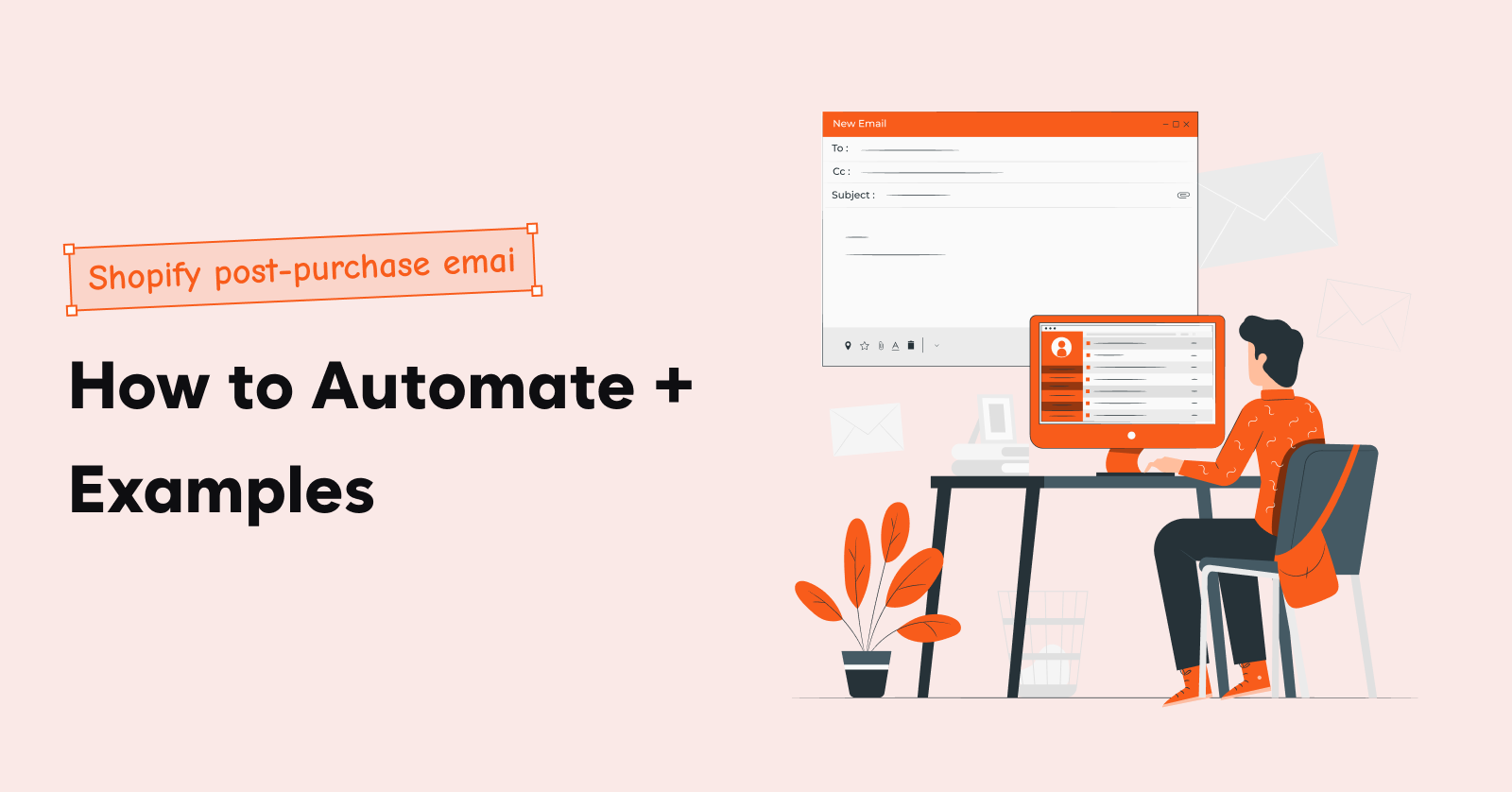A Shopify transactional email is more than just a confirmation of a sale. It’s a tool for keeping your customers engaged and ensuring their experience with your brand is seamless and trustworthy.
Whether it’s a shipping update, order receipt, or password reset, these emails serve as critical touchpoints in your customer’s journey.
In this blog, we’ll dive into the key types of Shopify transactional emails you should be using, why they’re important, and how they can help increase your customer service and brand reputation.
Send automated Shopify transactional emails with Retainful’s easy-to-setup automation.
What is a Shopify transactional email?
A Shopify transactional email is an automated message sent to customers after they take a specific action – like placing an order, creating an account, or resetting a password. It focuses on delivering essential information, not marketing or driving sales.
Types of transactional emails in Shopify
Shopify transactional emails are crucial for maintaining clear communication with customers throughout their shopping journey.
Here are the types of Shopify transactional emails:
- Order Confirmation Email
- Shipping Confirmation Email
- Delivery Confirmation Email
- Abandoned Checkout Email
- Order Cancellation Email
- Refund Notification Email
- Account Creation Email
- Password Reset Email
- Invoice Email
- Subscription Confirmation Email
How to send Shopify transactional emails?
You can send transactional emails in Shopify using its default settings in Shopify Admin.
The steps to send Shopify transactional emails are:
- Step 1: Go to Shopify Admin -> Notifications -> Customer Notifications.
- Step 2: Customize transactional email template
- Using default settings
- Using HTML Code
- Step 3: Send a test email
Let’s see these steps in detail.
Step 1: Go to Shopify Admin
To send Shopify transactional emails, open your Shopify Admin and go to Notifications -> Customer Notifications.
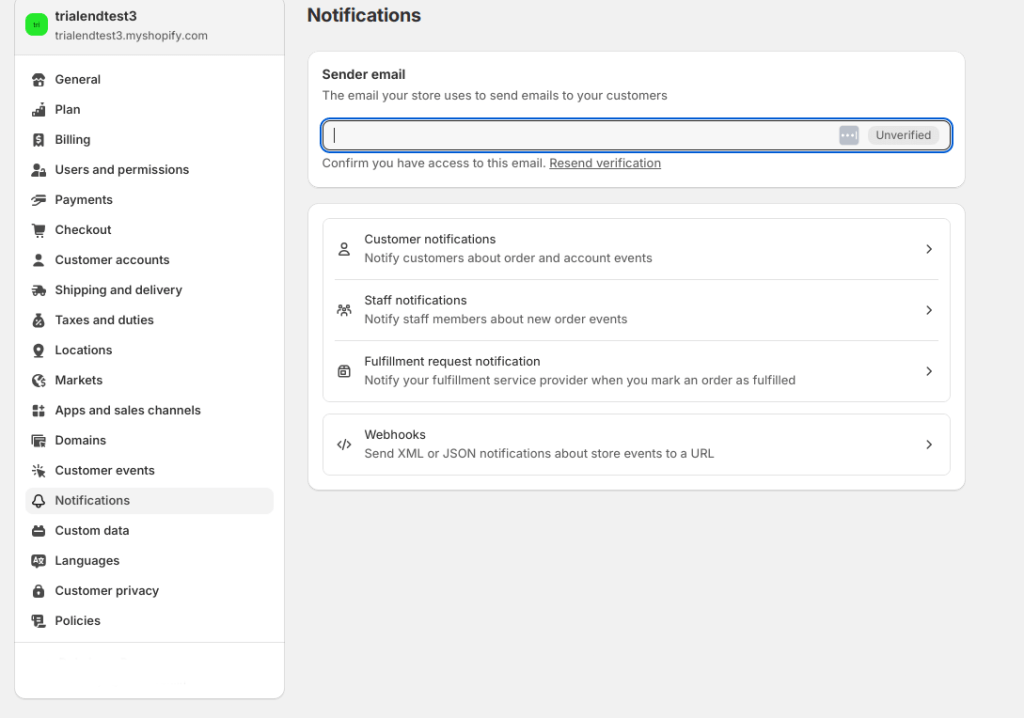
There will be a list of transactional emails sent after each event in the delivery process – like order confirmation, shipping confirmation, out for delivery, and more.
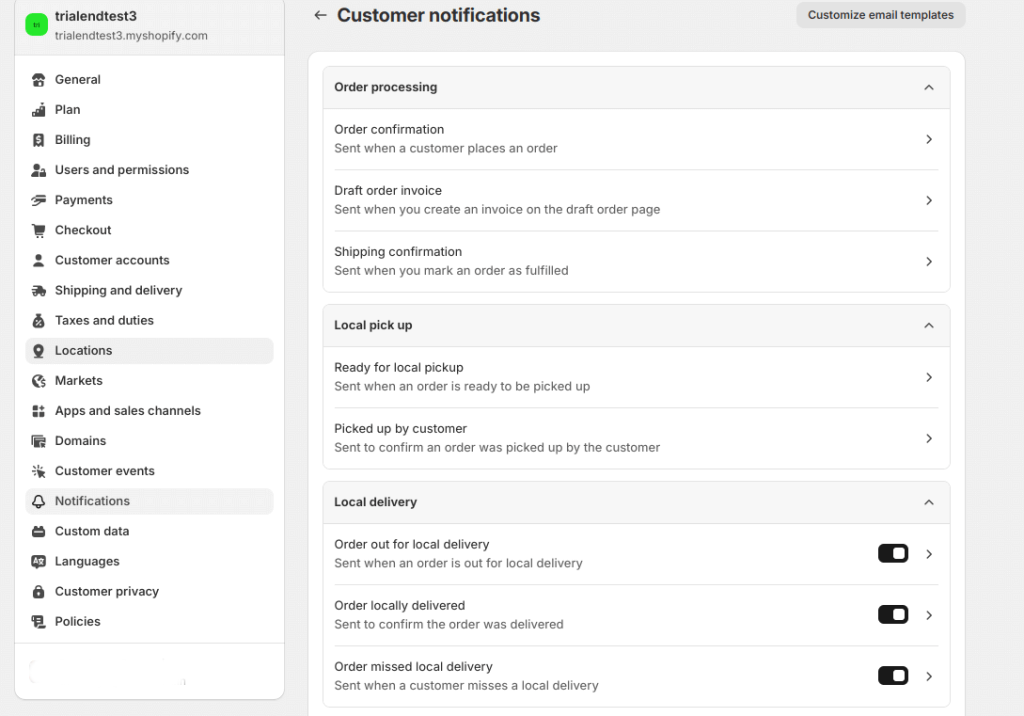
Click the ‘Order Confirmation’ to view the template.
Step 2: Customize Shopify transactional email template
You can customize the Shopify transactional email templates in 2 ways:
- Default Settings
- Using HTML code
1. Default Settings
Click the ‘Customize email templates’ at the top of the page. The changes you make here will be reflected across all the templates.

The customization options in Shopify default option are very minimal. You only get to edit the logo and accent color of the Shopify transactional email templates.
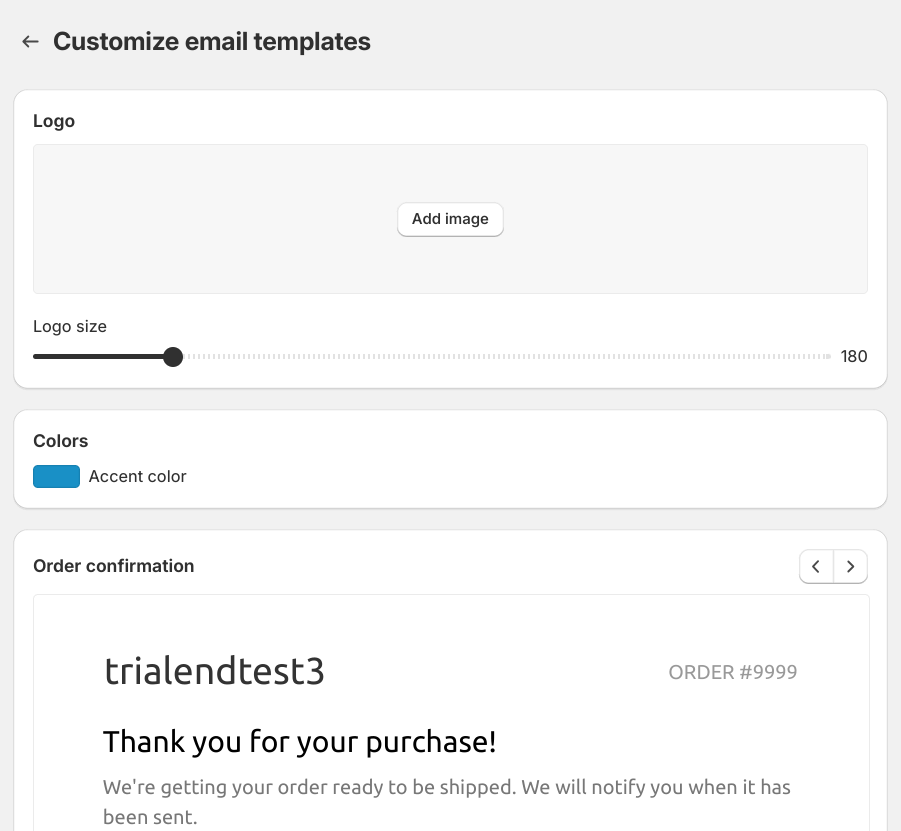
To create on-brand Shopify transactional email templates:
- Include your logo image
- Change accent color
2. Using HTML code
To fully edit the Shopify transactional email template and make it match your brand, you can edit the HTML code.
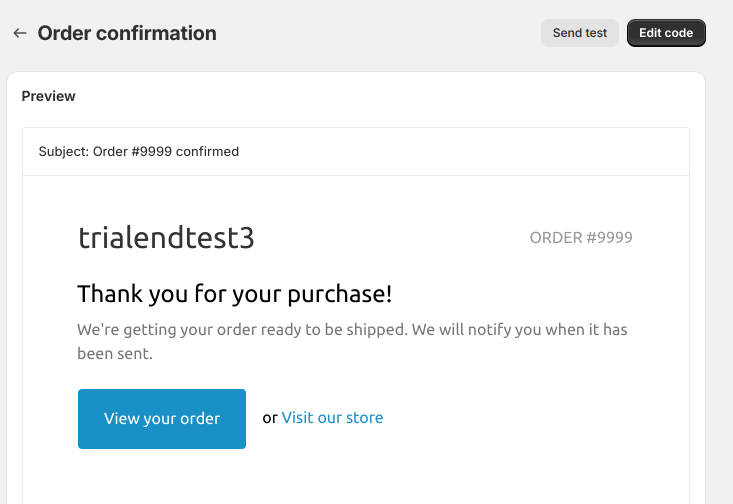
When you click ‘Edit Code’, an HTML editor will open.
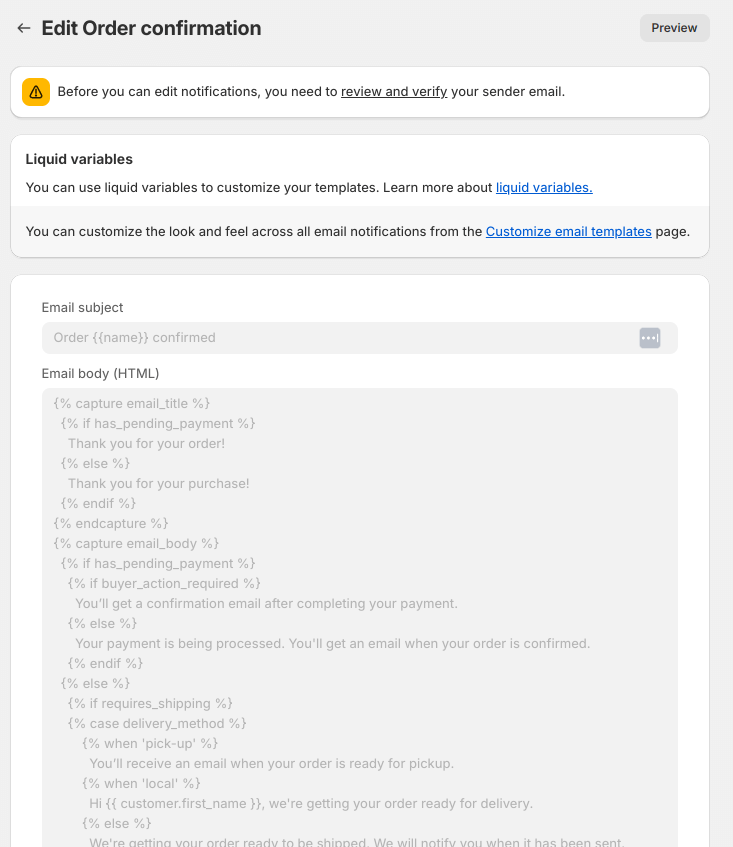
Step 3: Send test email
After finishing the Shopify transactional email customization, send a test email to check whether all the elements are in the right place as intended.
Customize Shopify transactional emails in clicks with Retainful’s ready-made templates and drag-and-drop email editor.
Automating Shopify transactional emails in Retainful
Retainful is an all-in-one Shopify email marketing app that has easy-to-set-up automation – you can automate Shopify transactional emails without any learning curve.
The steps to automate Shopify transactional emails are:
- Step 1: Install Retainful
- Step 2: Choose the email automation workflow
- Step 3: Set up triggers and wait time
- Step 4: Customize email templates
- Step 5: Send test email
Let’s dive into these steps in detail.
Step 1: Install Retainful
To automate Shopify transactional emails with an app, install Retainful from the Shopify app store and connect your store.
Step 2: Choose the email automation
Retainful allows you to send automated Shopify transactional emails like order confirmation emails, order cancellations, order refundsm product-specific follow-up emails, feedback review request emails, thank-you emails, and more.
To see the pre-built transactional email automation workflows, go to Retainful Dashboard -> Automation.
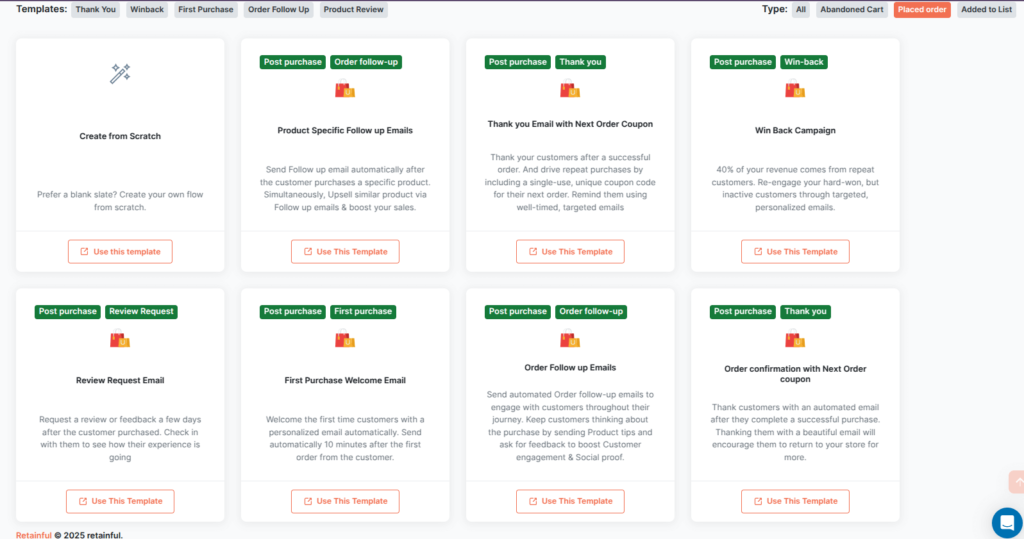
Step 3: Set up triggers and wait time
The trigger allows only the customer placed an order to enter the workflow.
In the Tigger rules, you can set conditions to send personalized Shopify transactional emails to a set of customers based on order history, order value, order status, product category, and more.
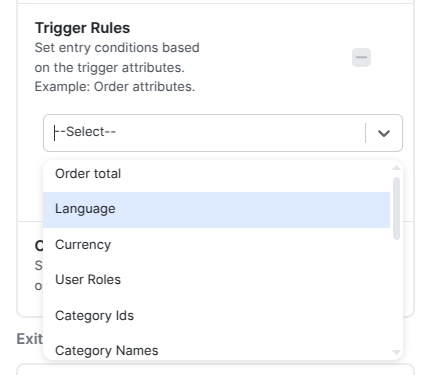
For example, to send product-specific Shopify transactional emails, enter the product name in the Trigger rule.
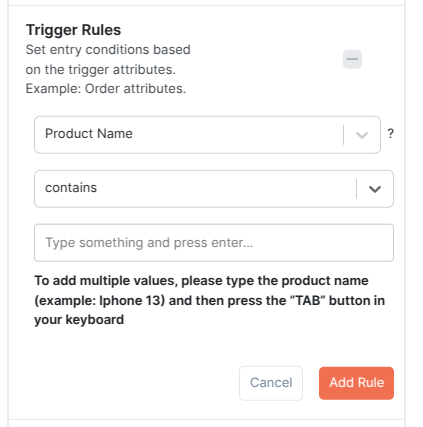
Step 4: Edit Shopify transactional email template
You can edit every element of the Shopify transactional email template, like logo, CTA, product images, cross-sell recommendations, and more.
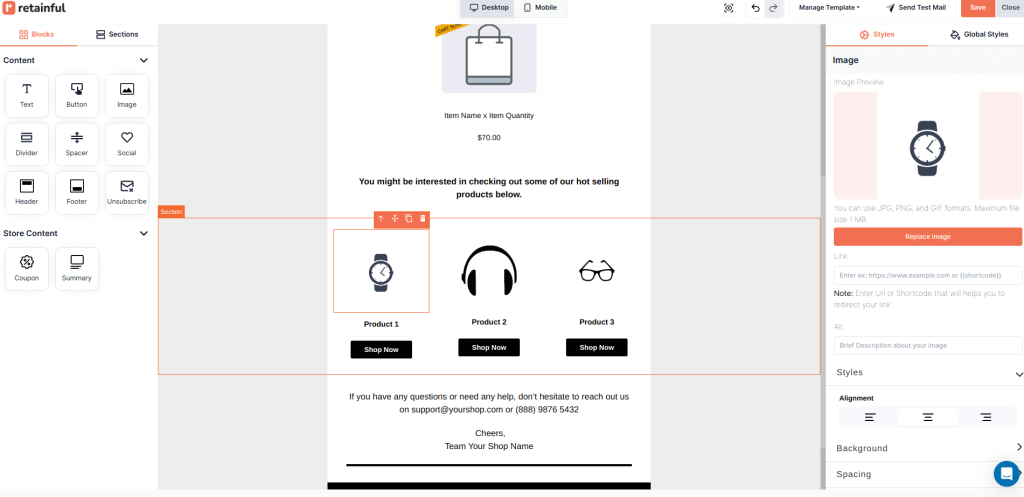
Step 5: Set up Shopify transactional email series
Retainful allows you to send multiple Shopify follow-up transactional emails at well-timed intervals:
For example, this is the email sequence in the Order follow-up workflow:
- First email: Order follow-up and upsell
- Second email: Product tips
- Third email: Product review request
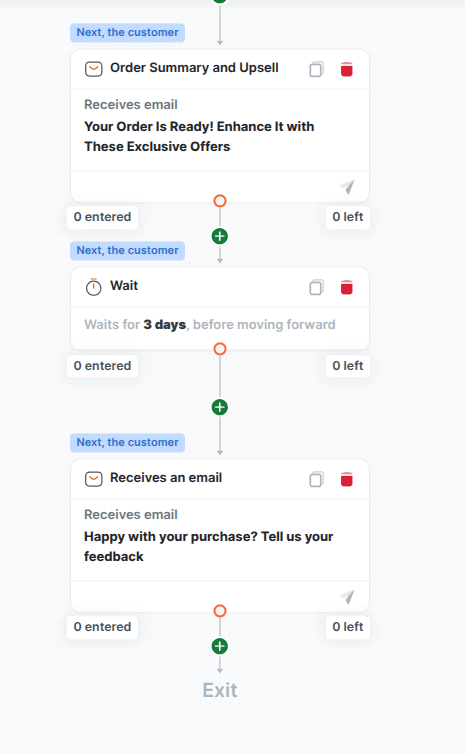
Step 6: Send test email
Send a test email to find out whether all the elements of the Shopify transactional email template fell into place.
Shopify transactional email examples and templates
1. Shopify order confirmation email

This Shopify order confirmation email from River Island is a masterclass in clarity, structure, and customer reassurance.
- Order + Delivery Info: The order number and estimated delivery date are right at the top – exactly where a customer looks first.
- Full breakdown of items: Each product includes name, image, SKU, size, and price.
- Cost clarity: Discounts and delivery fees are broken out. Seeing “20% off” and “Free delivery” reinforces value and satisfaction.
- Payment + addresses: Billing and delivery info are included, covering all the details a customer might want post-purchase.
- Support CTAs: Buttons for delivery, returns, and FAQs make self-service easy – great for reducing friction and avoiding customer support overload.
2. Shopify shipping confirmation email
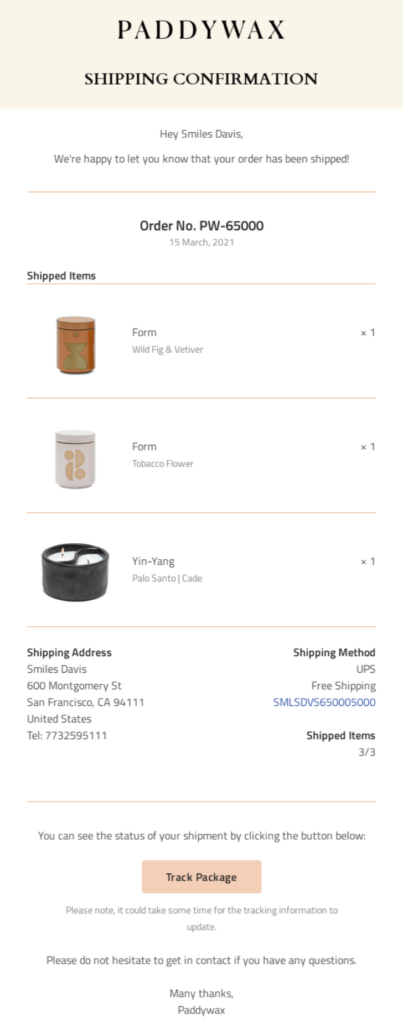
This Shopify shipping confirmation email from Paddywax is a textbook example of how to reassure customers and reduce post-purchase anxiety. Let’s break it down:
- Essential info front and center: Order number, shipping date, and shipping method are clearly displayed. These are the first things a customer wants to see.
- Visual confirmation of items: Each product is shown with an image, name, scent/flavor, and quantity. This visual reassurance helps customers quickly confirm everything is correct.
- Address and tracking: The shipping address is clearly displayed, along with a clickable tracking number. Bonus points for the big “Track Package” button makes life easier for the customer.
3. Shopify delivery confirmation email
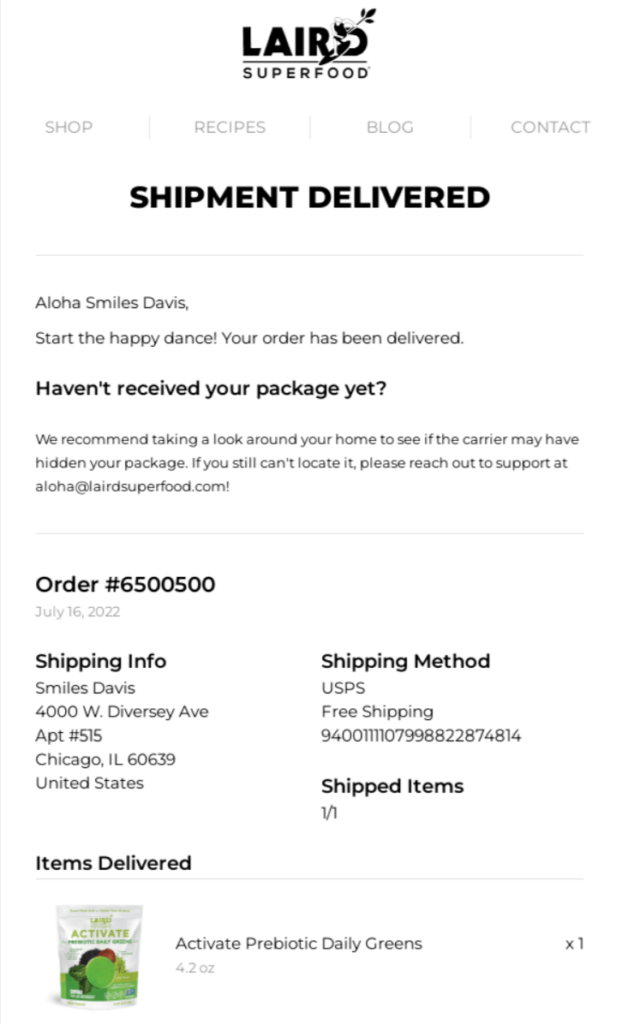
Here is why this a great Shopify transactional email example:
- Helpful instructions for missing packages: The email anticipates common issue and provides a solution.
- Order and shipping details: All relevant shipping information, such as the order number, shipping method, and tracking details. The inclusion of “1/1” under “Shipped Items” clarifies that the entire order has been sent
- Contact Information for Further Support: There is a clear call-to-action at the end to reach out to support. It provides an easy access to support in case there’s an issue further enhances the customer experience.
4. Shopify order refund email
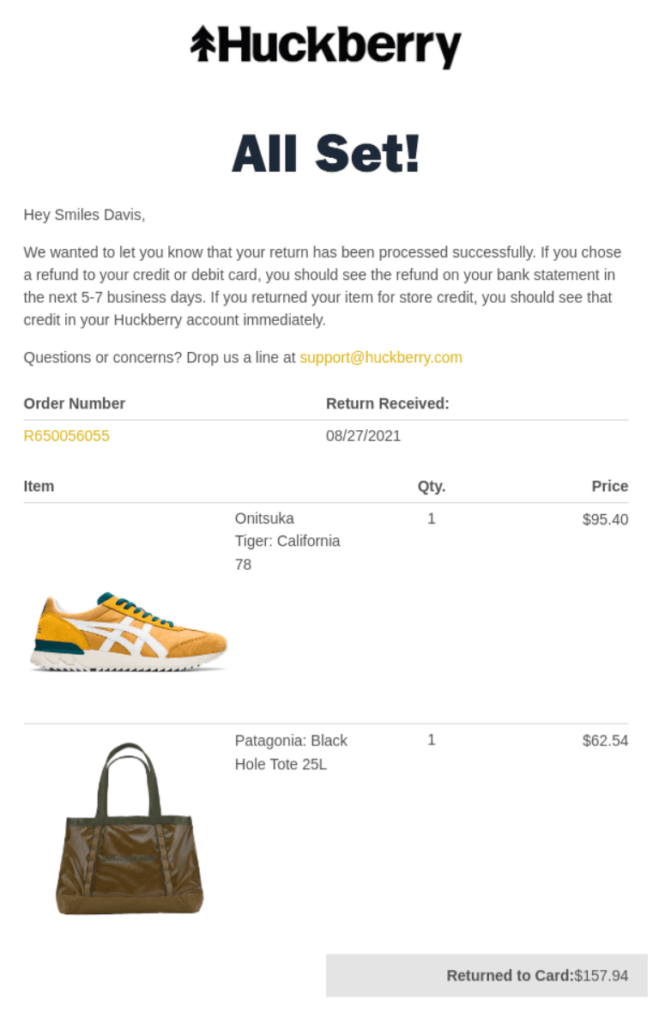
This Shopify order refund email from Huckberry is a great example of how to clearly communicate the refund process and build trust with customers. Let’s break down the best elements:
- Clear communication of Refund Process: Explains the two refund options and sets expectations about when the customer will see the refund.
- Helpful information: It specifies the expected timeline for the refund, providing transparency and setting clear expectations. Additionally, it states that store credit will be available immediately, giving the customer the option to make a quick purchase.
- Simple layout with order details: The order number, return date, item details, and prices are all neatly organized and easy to find.
- Visual confirmation of returned items: The email includes images of the returned items, so customers can easily recognize what was refunded.
5. Shopify abandoned cart email

- Clever copywriting: The headline “Finish what you carted.” is catchy and uses clever wordplay to immediately draw attention.
- Clear Cart Information: The email provides key details like the name of the product, quantity, and price. This is essential as it gives the customer a snapshot of what’s waiting for them in their cart
- Value Proposition: This Shopify transactional email template highlights that the product is cruelty-free, plastic-free, and uses clean ingredients. These values are a big selling point for many customers, who are conscious about the environment and product ingredients.
6. Shopify subscription confirmation email
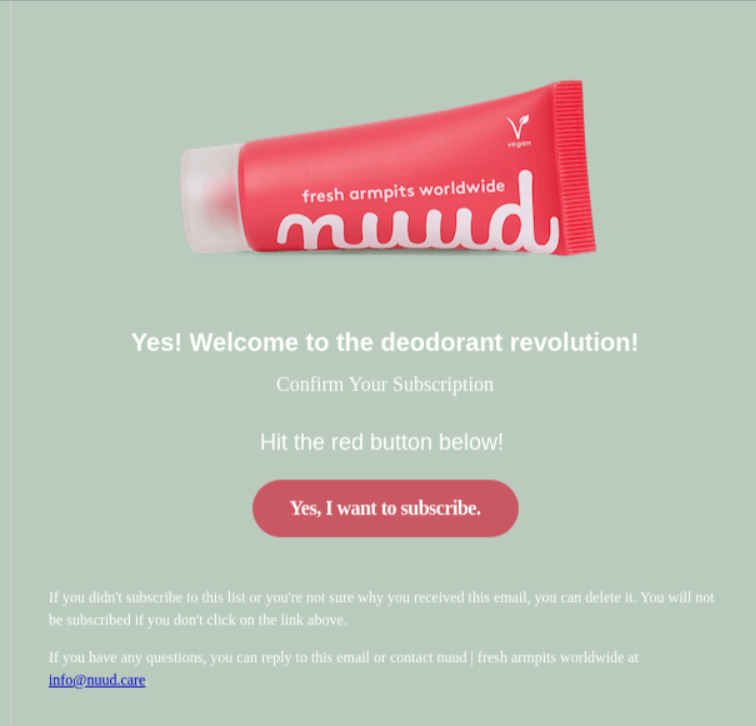
Here is why is this a great Shopify transactional email example for subscription confirmation:
- Engaging and Relevant Imagery: The image of the deodorant is directly tied to the product the customer has subscribed to.
- Clear Call to Action: The call to action (CTA) button, “Yes, I want to subscribe,” stands out. The language is action-driven and gives the recipient clear direction on what they need to do next.
- Simple, clean layout: The layout is clean and uncluttered. The main focus is the subscription confirmation, with minimal distractions.
- Easy opt-out option: This Shopify transactional email template provides an easy opt-out option for users who may not have subscribed intentionally.
Related Reading: Explore subscription confirmation email examples in our blog: 7 Best Double Opt-in Email Examples + Best Practices.
Send all types of transactional emails without any setup headache and design work with Retainful.
Wrapping up!!
Shopify transactional emails are your chance to provide more than just information, they are an opportunity to build trust, engage customers, and retain customers.
Don’t let them be an afterthought. Make them timely, clear, and consistent. A well-designed Shopify transactional email template can turn a simple confirmation into a lasting impression that increases your brand reputation.
So, take the time to optimize each touchpoint and watch customer satisfaction and loyalty grow.
Frequenty Asked Questions:
A customer action triggers a transactional email and contains essential information, like order confirmations, shipping updates, or password resets, not meant for promotional purposes, but to facilitate a transaction or user-initiated request.
Shopify transactional emails are managed in the Settings > Notifications section of your Shopify admin. From there, you can customize templates for order confirmations, shipping updates, account creations, and more.
Yes, Shopify has a built-in email system that handles both transactional emails and marketing emails. You can use Shopify Email for campaigns, and the platform sends automated transactional emails by default.
Yes, Shopify can send automated emails for order updates, account changes, shipping notifications, and more. With apps like Retainful, you can also automate abandoned cart emails and post-purchase flows.
Transactional emails provide necessary information related to a user’s action like receipts or shipping notices. Commercial emails promote products or services, like newsletters or sales campaigns.


